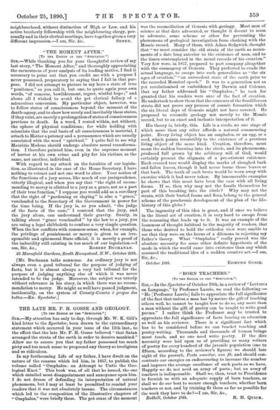THE LATE MR. P. H. GOSSE AND GEOLOGY. [TO THE
EDITOR 01 TRY "EPICTATO8.".1 SIR,—My attention has only to-day, through Mr. W. K. Gill's kind letter to the Spectator, been drawn to the extraordinary statement which occurred in your issue of the 11th inst., to the effect that the late Mr. P. H. Gosse believed " that Satan arranged the strata of the earth in order to deceive mankind." Allow me to assure you that my father possessed too much piety and too much sense to propound any theory so irreligious and so ridiculous.
In my forthcoming Life of my father, I have dwelt on the nature of the reasons which led him, in 1857, to publish the volume called " Omphalos : an Attempt to Untie the Geo- logical Knot." This book was, of all that he issued, the one which entailed most disappointment and annoyance upon him. I do not dream of defending its interpretation of natural phenomena, but I may at least be permitted to remind your readers that it was not absolutely insane. The circumstances which led to the composition of the illustrative chapters of
Omphalos," were briefly these. The pet craze of the moment
was the reconciliation of Genesis with geology. Most men of science at that date advocated, or thought it decent to seem to advocate, some scheme or other for preventing the phenomena of geological investigation from clashing with the Mosaic record. Many of them, with Adam Sedgwiok, thought that " we must consider the old strata of the earth as monu- ments of a date long anterior to the existence of man, and to the times contemplated in the moral records of his creation." Very few were, in 1857, prepared to part company altogether with the cosmogony of Genesis. They preferred to evade the actual language, to escape into such generalities as " the six ages of creation," "an antecedent state of the earth prior to the recorded Mosaical epoch." It was to a generation not as yet revolutionised or emboldened by Darwin and Colenso, that my father addressed his " Omphalos ; " he took for granted that his readers were sure of the fact of creation. He undertook to show them that the contents of the fossiliferous strata did not prove any process of cosmic formation which the six literal days of Genesis might not have covered. He proposed to reconcile geology not merely to the Mosaic record, but to an exact and inelastic interpretation of it.
His theory is, briefly, this. Life is a circle, no one stage of which more than any other affords a natural commencing point. Every living object has an omphalos, or an egg, or a seed, which points irresistibly to the existence of a previous living object of the same kind. Creation, therefore, must mean the sudden bursting into the circle, and its phenomena, produced full grown by the arbitrary will of God, would certainly present the stigmata of a pre-existent existence. Each created tree would display the marks of sloughed bark and fallen leaves, though it had never borne those leaves or that bark. The teeth of each brute would be worn away with exercise which it had never taken. By innumerable examples he shows that this must have been the case with all living forms. If so, then why may not the fossils themselves be part of this breaking into the circle ? Why may not the strata, with their buried fauna and flora, belong to the general scheme of the prochronic development of the plan of the life- history of this globe ?
The ingenuity of this idea is great, and if once we believe in the literal act of creation, it is very hard to escape from the reasoning that leads up to it. It was an example of the looseness of thought habitual to the majority of readers, that those who desired to hold the orthodox view were unable to see that they were on the horns of a dilemma in rejecting my father's theory. What " Omphalos " really proved was the absolute necessity for some other definite hypothesis of the mode in which the world came into existence than any which assumed the traditional idea of a sudden creative act.—I am, Sir, &c.,






































 Previous page
Previous page